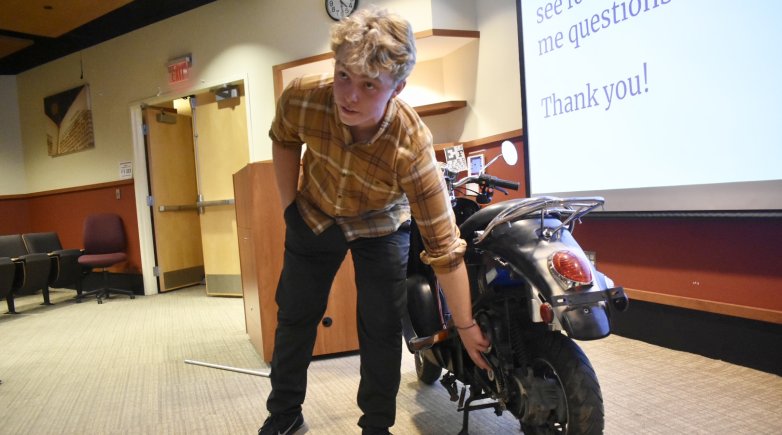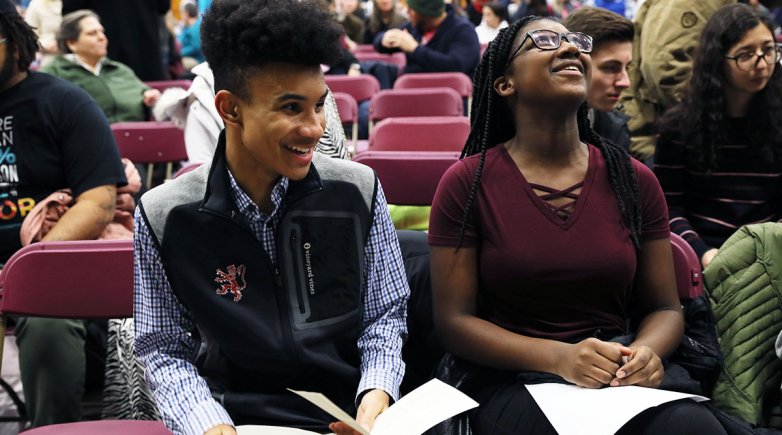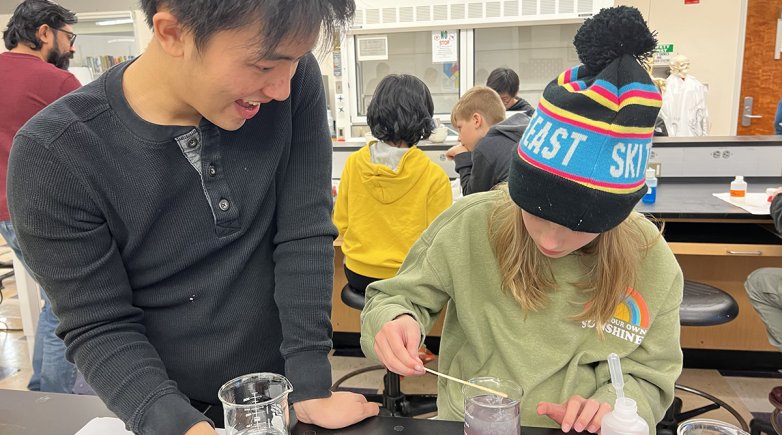Independent study stokes seniors' passion projects
From bow-building to game theory to cancer-cell research, Exeter seniors dig deeply into personal academic interests.
Charlie Scales '24 shows off his handiwork to friends from Main Street Dorm during his senior project presentation.
When Charlie Scales ’24 looks back on the last four years at Exeter, it will be four nights sleeping on the ground in Vermont that will take up a prominent space in his memory.
The senior from Asheville, North Carolina, spent late April in the woods, attending a primitive bow-building workshop in which he crafted a working bow from a stave of Osage orange tree wood. The work required long hours peeling bark off the stave with a dull draw knife and a wood-shaping rasp, toil that filled his dreams with the relentless scraping sound of rasp on hardwood. An easy “A” it was not.
 The bow-making class was part of Scales’ independent study project. The program allows Exeter seniors to study areas of interest that fall outside traditional course descriptions and develop their own curriculum. Interested seniors, with approval from the faculty, design individual or joint projects of comparable value and scope to those of an academic course.
The bow-making class was part of Scales’ independent study project. The program allows Exeter seniors to study areas of interest that fall outside traditional course descriptions and develop their own curriculum. Interested seniors, with approval from the faculty, design individual or joint projects of comparable value and scope to those of an academic course.
Scales is drawn to indigenous cultures and their symbiotic connection with the land. He spent spring term researching the historical Wabanaki, a confederation of five eastern Algonquin nations stretching from modern-day New York state to Newfoundland. He studied the Wabanaki worldview and culture and their deep-seated relationship with the place in which they lived.
Scales read about subsistence methods, which included farming, advanced horticulture and hunting, all with a goal of developing a deeper understanding of how people lived in the region ever since the glaciers retreated 12,000 years ago. His capstone was the bow-building workshop — attended with his faculty mentor, English Instructor Jason BreMiller.
Yes, he has flung arrows with his bow. No, he has not hunted with it.
Other senior projects conducted this spring by members of the class of 2024 included:
Oliver Liu, Alchemy In Oncology: Transmuting Chemotheraputic Waste into Platinum: Platinum-based chemotherapies are a cornerstone of cancer treatments, with their ability to damage the DNA of cancer cells, and most of the platinum ends up literally going down the drain. This creates a dual problem of rare elements being wasted, and toxic platinum compounds entering the environment/wastewater systems. Liu explored multiple chemical processes that would allow for the recovery of waste into metallic platinum, and how to optimize for maximal recovery rates.
Aden Geonhee Lee, To Wait for the Sun and All Things Loved: Lee wrote and compiled a collection of poetry, short stories, interviews and letters centers around the personal and visceral aspects of biology — the parts that tell us what it means to be human.
Natalie Welling and Ava Zhao, Shell Shenanigans: Exploring Non-Discrete Game Theory Through the Lens of Hermit Crabs: Continuing their study of game theory from a Fall term Math 690, Welling and Zhao spent the past few months investigating game theory and its applications in situations with continuous time and strategy spaces. In the format stories, some equations and a crab-themed picture book, the pair created a blend of computational rigor and beautiful art.
Alex Rosen and Anvi Bhate, The Intricacies of Effective Leadership: Styles, Ethics, and Critiques: Over the course of the term, Rosen and Bhate explored leadership theory and analyzed various historical examples of leaders, ranging from John F. Kennedy to Mao. They in turn took their study to campus through interviews with administration, faculty, coaches and student leaders to produce a documentary-style presentation showcasing community opinions on the leadership.
William Weber, “Return”, an original album: Weber took some of the 500-plus snippets of original music he recorded when he was younger on the voice memo app on his phone to develop an album. “One day, I hoped to return to these moments and develop these snippets of lyrics, tunes chord progressions, and beats into full songs I could share. Through this project, I also experienced a return to the beautiful process of expressing what I am feeling through beautiful heartfelt moments of inner creativity.”
Achyuta Rajaram, Peel of Fortune: Exploiting K-40 Beta Decay for Quantum Random Number Generation: Rajaram studied radiation as a source of entropy, or true random numbers, designing and fabricating a detector for low-energy beta radiation and using signal processing techniques in order to turn the raw data into a usable source of random numbers.
Diego Shetreet, Exploring the Cause of Haploinsufficiency: Shetreet studied haploinsufficient genes in the human genome that are linked to a wide variety of health conditions, including the formation of tumors, with a goal to better understand the cause of haploinsufficiency and the genetic underpinnings of diseases like cancer.



